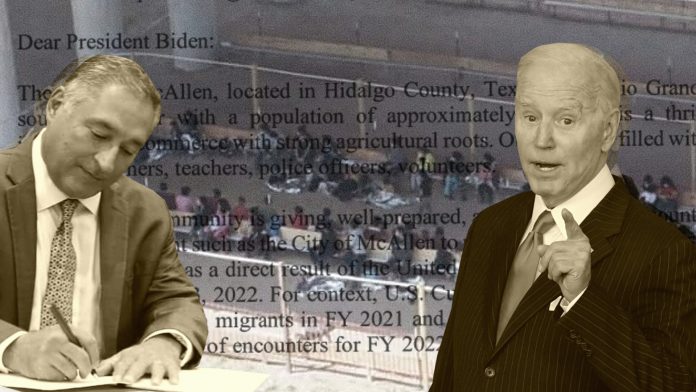
McAllen Mayor Javier Villalobos is calling on President Joe Biden to reconsider the decision to rescind Title 42 on May 23, citing the continued threat of COVID-19.
Villalobos penned a letter to the Biden administration on Wednesday in response to the announcement from the Centers for Disease Control and Prevention that it would be lifting Title 42, a health policy enacted during the COVID-19 pandemic to turn away asylum seekers at the border.
“Although our community is giving, well-prepared, and proactive, no amount of preparation will allow for a local government such as the City of McAllen to respond to the dramatic rise in the undocumented migration that is anticipated as a direct result of the United States federal government announcing the end of Title 42 effective May 23, 2022,” Villalobos wrote.
He pointed to the BA.2 variant of the virus that was spreading in the northeastern part of the U.S. and said that delaying the rescission of Title 42 would give the administration more time to mobilize a response to combat the threat of the new variant.
The mayor added that while COVID-19 cases and hospitalizations were decreasing in the area, “current data suggests that the coronavirus once again poses a serious threat to public health.”
He noted that of the migrants released into the McAllen area since January, 12.3% tested positive for COVID-19. However, that positivity rate has dropped significantly in recent weeks, according to city staff.
The current positivity rate is between 4 and 6%, according to Assistant City Manager Jeff Johnston who reported the latest immigration figures during a McAllen city commission meeting on Monday.
The migrants are tested for COVID-19 upon their release from U.S. Customs and Border Protection.
CBP typically drops them off directly at Anzalduas Park where they are tested. If they test positive, they remain at the park for quarantining while those who test negative are taken to the Humanitarian Respite Center in downtown McAllen where they receive assistance in making travel arrangements.
At the park, Johnston reported that they average fewer than 100 people there per night and fewer than 150 total that are quarantining throughout the area. The capacity of the park is currently 800 people, but the city has the ability to increase that to 1,200 within 24 hours if needed.
With the end of Title 42, Johnston acknowledged the possibility that they’ll see a significant increase in the number of people arriving at the border, but City Manager Roy “Roel” Rodriguez said Wednesday that the city was prepared.
“We’re always prepared, the city of McAllen has a very detailed emergency management plan and a structured team,” Rodriguez said. “We respond to emergencies all the time and this immigration issue, as you know, it’s been going on for, now, eight years and so as we need to ramp up, we do, and as we need to cut back, we do.”
He said access to the Anzalduas Park, which was made possible through a partnership with Hidalgo County Precinct 3, was a big advantage in their handling of the situation.
“There’s really an unlimited amount of space there for immigrants. I don’t think space for immigrants at Anzalduas is ever going to be a problem,” Rodriguez said. “We’ll run out of personnel to handle it before we run out of space at Anzalduas.”
During Monday’s city commission meeting, Commissioner Victor “Seby” Haddad asked if the city was planning for a worst-case scenario in which non-governmental organizations, like Catholic Charities of the Rio Grande Valley, became over-burdened.
Johnston replied that the city has communicated to the state that if the numbers increase dramatically, the ability to move people out of the border area would become an issue, noting the limited number of bus seats and airplane seats available.
“Our message to the state has been: we’re going to need help with that,” Johnston said.
As for space, he added that the city is mainly focusing on how they could increase their footprint in terms of people and supplies at Anzalduas Park, if needed.
“We’re in constant communication with our state and now our federal partners in emergency management, so it’s become routine that they’re communicating by phone very frequently,” he said.
Johnston also announced the city recently received just over $1.6 million in additional funds from the Federal Emergency Management Agency to address the issue, with additional requests for more financial assistance still pending.
FEMA has so far funded about $20 million of immigration-related expenses for the city, according to Rodriguez.
“Something that changed last year when it ramped up again in January of 2021 is FEMA was willing to front the money,” Rodriguez said. “Because of all of the issues that we had had to try to get reimbursed from prior years, we were reluctant to take any more responsibility on, so they agreed.”
The funds are strictly for any expense having to do with immigration that the city encounters — both at the respite center and at Anzalduas Park.




